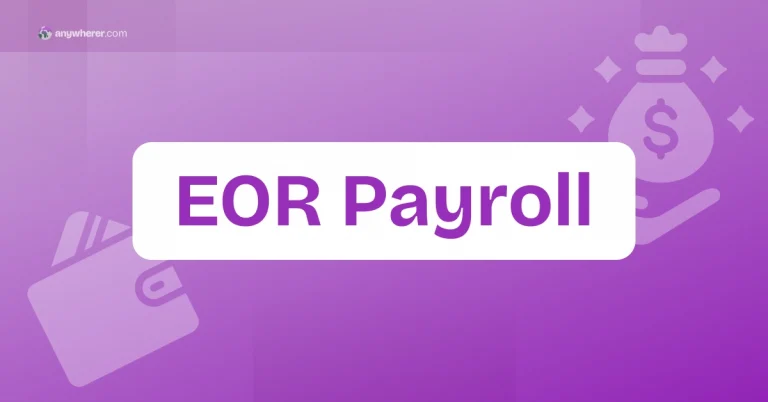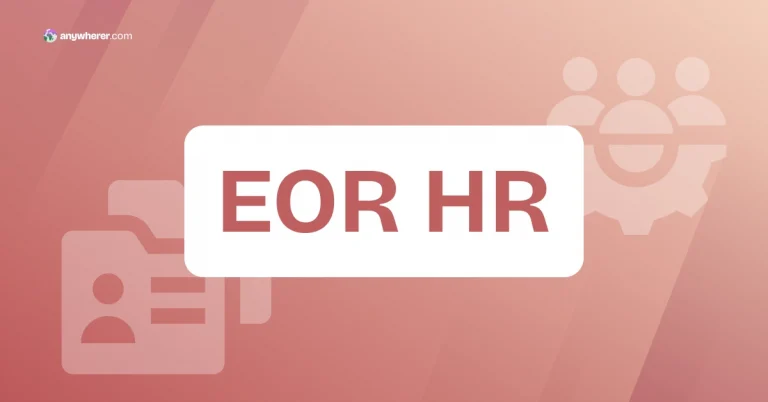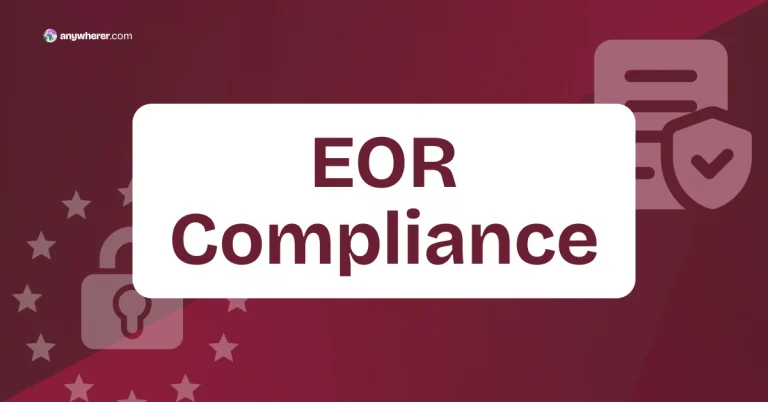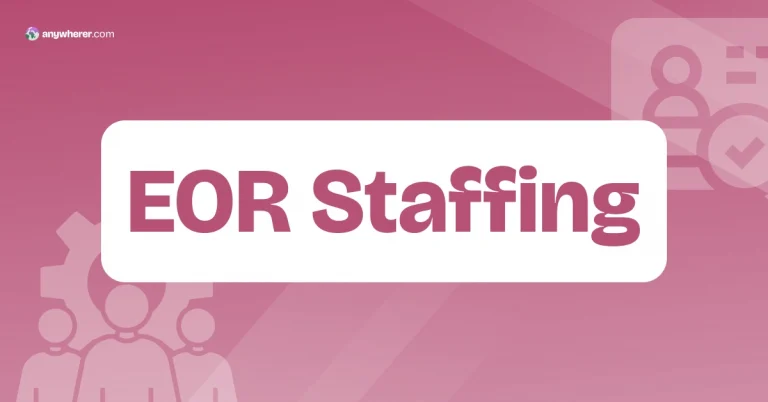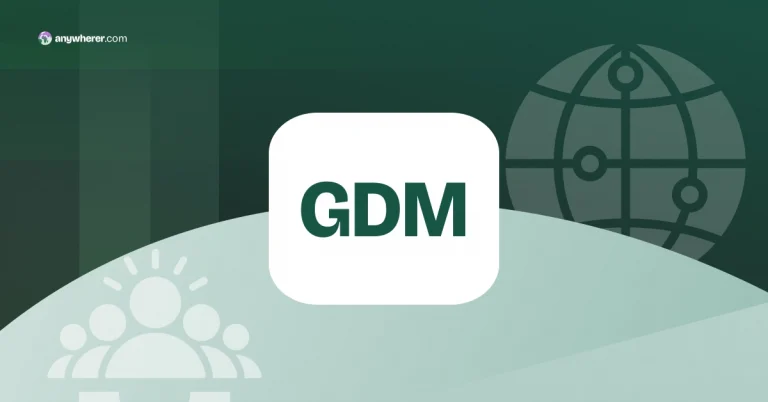These days, the talent market is all about speed, skill shortage challenges, and cost optimization. Considering this, traditional hiring models often fall short in attempting to meet these high demands. To fill this gap, alternative approaches are attracting growing interest. In this article, we’ll explore one of them — Recruitment Process Outsourcing.
So, what is Recruitment Process Outsourcing exactly? Let’s dive in — starting off with a brief definition.
Recruitment Process Outsourcing Meaning and Value
Based on Recruitment Process Outsourcing meaning, it becomes clear RPO partnership goes far beyond traditional agency hiring. Since RPO providers embed themselves within the business, they function as an extension of the internal HR or talent acquisition team.
Recruitment Process Outsourcing Definition
Recruitment Process Outsourcing is a strategic partnership where an organization transfers all or part of its HR responsibilities and processes to an external service provider: candidate sourcing, screening, onboarding, employer branding, compliance, etc.
Here’s what differentiates them from other global hiring models:
- RPOs take full responsibility for the entire recruitment lifecycle, not just filling individual roles.
- Unlike agencies focused on short-term placements, RPO is built around a long-term hiring strategy.
- RPO teams represent your employer brand in the market, thus ensuring consistent messaging and candidate experience.
- Most RPO providers bring advanced recruitment tools (ATS, CRM, AI, etc.) and can integrate with your existing tech stack.
Above all, the best Recruitment Proces Outsourcing companies commonly offer a personalized, flexible approach to suit any client’s needs, which makes a significant impact on HR efficiency.
Recruitment Process Outsourcing Benefits
Speaking of impact, RPOs are highly valued for their ability to deliver consistent, scalable, and high-quality hiring outcomes.
In this Recruitment Process Outsourcing guide, let’s review some core benefits of outsourcing recruitment and selection process:
- Streamlined time-to-hire. Thanks to dedicated resources and optimized workflows, RPO providers can ensure faster, more efficient recruitment.
- Scalability and flexibility. RPO allows businesses to scale hiring based on demand without overburdening HR.
- Improved employer branding. Through a proven track record of providing consistent candidate experiences, RPO companies help organizations shape a unified, appealing, and trustable employer image.
- Compliance and risk mitigation. RPOs bring local market hiring expertise and ensure adherence to labor laws and best practices.
- Improved quality of hire. With expertise-based market insights, specialized talent pools, and proven assessment methods, RPO providers can significantly enhance the quality of hired employees and efficiently fill specialized, niche roles.
- Cost efficiency, driven by the RPO’s ability to consolidate recruitment spend, reduce agency dependency, and optimize hiring budgets.
- HR process optimization due to the RPO’s proven track record of standardizing recruitment workflows, reducing administrative burden, and integrating recruitment with broader HR functions.
- Access to advanced tech solutions, including state-of-the-art ATS platforms, AI tools, and reporting dashboards.
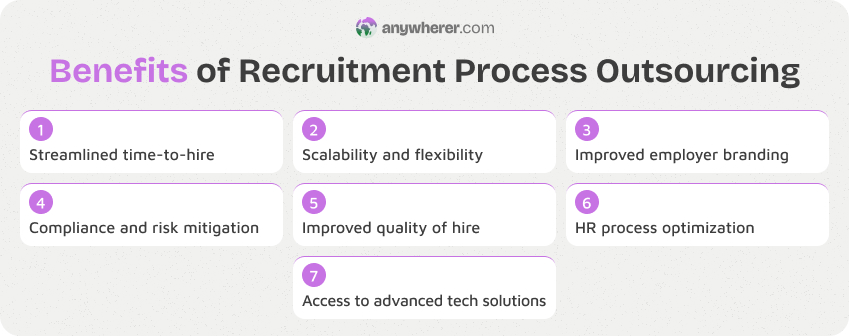
Ultimately, remote global Recruitment Process Outsourcing partners provide a robust toolkit of solutions and services to keep up with fierce market competition worldwide, whichever industry or business type their client is.
In the meantime, advantages of recruitment process outsourcing come with several challenges. Explore them below.
Challenges of Recruitment Process Outsourcing
Partnering with an RPO provider can introduce a few challenges to the companies, particularly at the initial stage. Let’s review the three most common RPO partnership bottlenecks.
Challenge #1: Collaboration issues
One common concern is loss of control — since internal teams may feel distanced from hiring decisions. This, in turn, might result in cultural misalignment, with external recruiters not fully grasping the company’s values and thus unable to secure right-fit hires.
Challenge #2: Operational disruptions during transition
The transition phase may also bring workflow disruptions or systems integration issues, particularly in cases when change management is not handled properly or there is no clear plan in place.
Challenge #3: Hidden costs
Finally, closely consider the cost-related challenges. Undoubtedly, RPO is often cost-effective in the long run — however, at times, additional costs can be quite hefty, especially if the pricing structure is not fully transparent or flexible. Therefore, closely investigating Recruitment Process Outsourcing pricing models is a must.
Ultimately, while challenges may occur, there are ways to overcome them. Explore the mitigation strategies listed below:
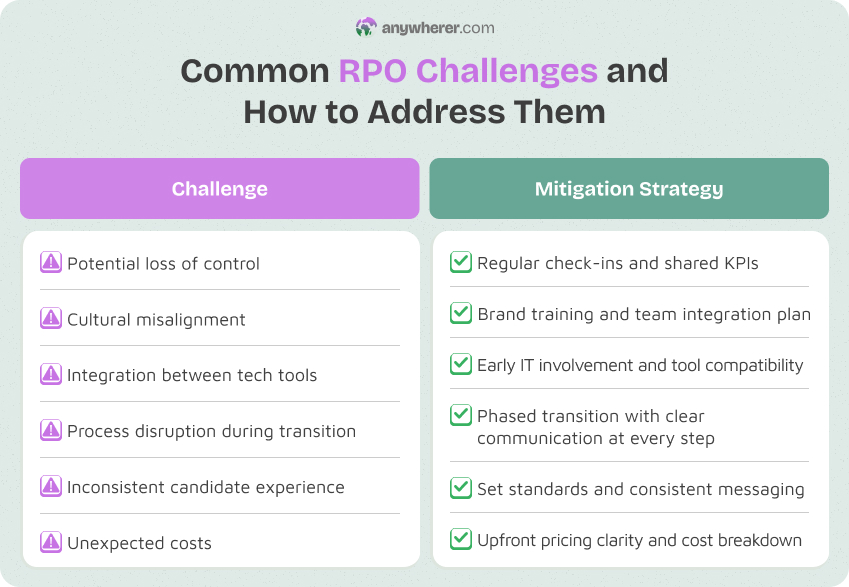
How Does Recruitment Process Outsourcing Work?
The RPO provider typically covers every step of the hiring journey. In doing so, it works closely with the company based on a pre-established, structured collaboration plan. HR roles are divided between an organization and its RPO partner as follows:
- The RPO provider takes charge of sourcing, screening, and shortlisting candidates, ensuring all hires meet legal and organizational standards. In doing so, they use targeted outreach and assessment tools to build a qualified and efficient pipeline.
- The organization oversees the entire HR strategy and participates in key hiring decisions, as well as sharing responsibilities in activities where cultural alignment is essential: final interview rounds, onboarding, optimizing employer branding, and others.
Together, the RPO provider and the organization are dedicated to creating a seamless, consistent recruitment experience. For example, they can jointly develop new hiring strategies, work on improving employer branding, analyze progress, and yield insights from data to optimize current operations. With such a unified approach, the partnership ensures efficiency and better results.
Diving into a Recruitment Process Outsourcing model, explore a step-by-step process guide below:
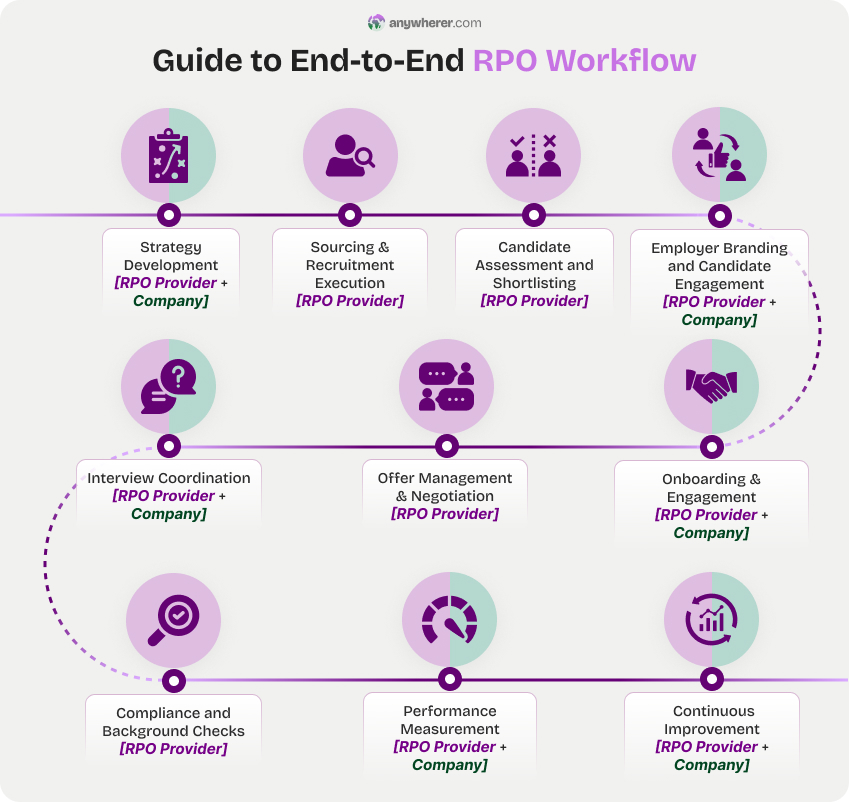
Closing Thoughts on Outsourcing Recruitment Process
To define recruitment process outsourcing, it is worth highlighting that RPO partnership can truly transform how organizations hire and onboard talent. The uniqueness of such a partnership lies in the abilities of RPOs to embed themselves into their clients’ operations. This, in turn, can bring numerous benefits — streamlined recruitment efforts, faster time-to-hire, and cost efficiency, to name a few. Plus, above all, with RPO services tackling numerous HR tasks, internal HR teams can focus on strategic tasks.
However, ultimately, as with any strategic move, success with RPO depends on several factors. Opting for the right-fit provider, setting clear expectations and responsibility areas, and finding ways to collaborate effectively all impacts the eventual partnership success.
Therefore, to ensure a maximized ROI, organizations should meticulously analyze multiple aspects, from benefits to potential challenges to an RPO’s pricing model. Doing so, companies can make a well-informed decision that could help them grow at scale with a trusted partner.
FAQs on Global Recruitment Process Outsourcing
What is RPO Recruitment Process Outsourcing and what services does it include?
As per the definition of Recruitment Process Outsourcing, RPO providers serve as trusted HR partners in managing the full hiring lifecycle, from job requisitions to candidate screening to compliant onboarding and beyond.
How long does it take to implement Recruitment Process Outsourcing solutions?
The ultimate transition duration may widely vary depending on scope and specific steps in IT recruitment process outsourcing transition established by RPO providers. However, in most cases, the implementation process takes between 4 and 12 weeks.
What should I look for when choosing a Recruitment Process Outsourcing provider?
Before opting for an RPO partner, consider its industry experience, scalability, capacity, as well as technology and cultural fit. Make sure it offers transparent pricing with no hidden fee or extra expenses. Try to pinpoint and closely analyze all Recruitment Process Outsourcing advantages for your specific business case. The best RPO providers should offer flexible, tailored solutions that align with your unique hiring needs.
Is Recruitment Process Outsourcing suitable for remote or international hiring?
Yes, most RPO providers have global networks, remote hiring infrastructure, and knowledge of local compliance to support international recruitment.
When should a company consider RPO?
The Recruitment Process Outsourcing business model can prove a great value for businesses requiring improvements in talent quality, scalability, and cost efficiency. It can also be a great fit for companies that struggle with hiring process bottlenecks or undergo rapid growth — be it an expansion into new markets, high-volume or seasonal recruitment, or anything else.
Discover if Recruitment Process Outsourcing is the best match for your business.

Yaryna is our lead writer with over 8 years of experience in crafting clear, compelling, and insightful content. Specializing in global employment and EOR solutions, she simplifies complex concepts to help businesses expand their remote teams with confidence. With a strong background working alongside diverse product and software teams, Yaryna brings a tech-savvy perspective to her writing, delivering both in-depth analysis and valuable insights.

